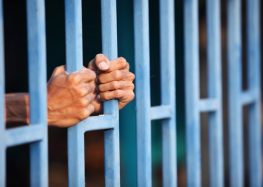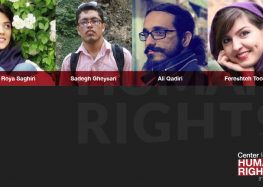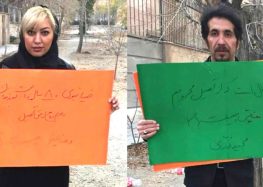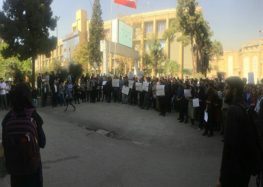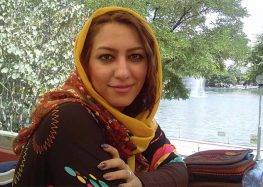Student Group Report Calls for End to “Educational Apartheid”
 The Advocacy Council for the Right to Education (ACRE), also known as the Council for Defending the Right to Education, has published a new report detailing the increasing persecution of and discrimination against university students in Iran. The report notes that this practice has become a trend since Mahmoud Ahmadinejad’s ascension to power, and has only accelerated since: “The educational apartheid has specifically gained speed over the past three years, with hundreds of students … banned from pursuing their education through rulings issued by Disciplinary Committees on campuses and the Ministry of Science’s Disciplinary Committee.”
The Advocacy Council for the Right to Education (ACRE), also known as the Council for Defending the Right to Education, has published a new report detailing the increasing persecution of and discrimination against university students in Iran. The report notes that this practice has become a trend since Mahmoud Ahmadinejad’s ascension to power, and has only accelerated since: “The educational apartheid has specifically gained speed over the past three years, with hundreds of students … banned from pursuing their education through rulings issued by Disciplinary Committees on campuses and the Ministry of Science’s Disciplinary Committee.”
The report notes that the Minister of Science, Kamran Daneshjoo, “has given two insulting and threatening speeches against the students,” and raises concerns “that starring and banning students from their right to education will be spreading.” The report calls for an end to the violations of Iranian students’ rights to education, speech, and association from assembly, as well as a condemnation of Daneshjoo’s statements.
The Advocacy Council for the Right to Education (ACRE), an organization founded by students who have been banned from education and starred students, was formed in September 2008. According to the founders of this student organization, the Council has, from the beginning, remained an independent, apolitical, and guild organization whose sole purpose was concentrated on the basic human right to education. Since its establishment, many ACRE members have been imprisoned for following up on the right to education. Zia Nabavi, Majid Dori and Mahdieh Golroo are some of the prominent members of this student group that are currently in prison.
The full text of the report is below:
___________________________________________________________
Comprehensive Report by the Advocacy Council for the Right to Education (ACRE) About Ban on Education
End the continuous, organized, and systematic educational apartheid
Seven years after Mahmoud Ahmadinejad came to power, the trend to ban students from their basic right to education continues and starred and banned students remain prisoners, increasing in numbers. The educational apartheid has specifically gained speed over the past three years, with hundreds of students have been banned from pursuing their education through rulings issued by Disciplinary Committees on campuses and the Ministry of Science’s Disciplinary Committee who all pursue the illegal trend of starring students in the process of their graduate school entrance examinations.During this time, dozens of these banned students have been arrested and face long-term prison sentences.
Even so, during the past month, the coup government’s Minister of Science, Mr. Daneshjoo, has given two insulting and threatening speeches against the students, and we are concerned that starring and banning students from their right to education will be spreading.
The Advocacy Council for the Right to Education (ACRE) publishes this report in keeping with its civil and guild activities to defend the basic and human right of education and to condemn Mr. Daneshjoo’s recent statements. This report comes in five sections as follows:
- Government pursues second cultural revolution
- Consistent, systematic, and planned educational apartheid in Iran
- Starring students tantamount to shutting down the Constitution
- Banning students from their right to education, an apartheid crime
- Banned students in prison
1.Government pursues second cultural revolution
Following the trend to ban students from their right to education and starring students during Ahmadinejad’s first government, Kamran Daneshjoo is now continuing same destructive policies against the foundation of science and knowledge in the country from his seat as Minister of Science after his key role in coup during the presidential election of 2009. ACRE believes that Mr. Daneshjoo is in charge of holding second cultural revolution on behalf of the government.
Mr. Daneshjoo’s recent criminal statements and his threats on students for further purging are considered in the same direction. Such statements are made by an individual whose name has been reflected in the still-open case of the 2009 elections coup, the attack on Tehran University, and the biggest case of financial corruption in Iran’s economic history.
Kamran Daneshjoo who was exposed to have a fabricated Ph.D. and whose scientific article was perjured, leading to the publisher’s apology, remains in the head of the highest scientific organization in the country; yet he brazenly speaks of corruption in universities and threatens and bullies the students.
ACRE also states that since the arrival of Kamran Daneshjoo in the Ministry of Science and Technology, the rulers have attempted a quiet cultural revolution.ACRE believes that his choice as the Minister of Science, considering his closeness to the power structure and his multiple character flaws that make him prone to following orders from security organization, is intended to cleanse the universities of critical students and faculty members and ending all political, cultural, and guild activities inside the country’s universities.
Mr. Daneshjoo’s recent statement, “The university is a place of support for the regime and the government,” is evidence to support our claim that Kamran Daneshjoo’s mission is to head the second Cultural Revolution.
The Advocacy Council for the Right to Education (ACRE) condemns Kamran Daneshjoo’s recent criminal statements that “there is no place in universities for critics” and expresses concern about the spreading trend of banning students from education, and believes that Kamran Daneshjoo consistently threatens students and bans them from education with the intent to deflect public opinion and cover up the dark points of his personal, political, and economically corrupt life.
It seems that his recent threats are also in reaction to his repeated scandals in the media about his life during education period in the UK. History of Mr. Daneshjoo during studying abroad and also his life before Islamic revolution in Iran shows his deception in speaking of “Islamization of universities” through approaches employed by the Taliban, and of “establishing separate boy and girl universities.”
2.Consistent, systematic, and planned educational apartheid in Iran
Between 2006 and 2011, each year dozens of student activists with distinguished rankings in Iran’s Graduate Entrance Examination, have been banned from enrolling in universities and pursuing their graduate studies. In 2006, student activists who had passed the Graduate Entrance Examination and whose names had appeared in the list of admitted students in the Sanjesh [measurement] Organization’s newspaper, faced stars next to their names in their enrollment forms when they appeared to enroll in their universities of choice.Students who had three stars next to their names were never allowed to continue their education.In the years 2007 and 2008, as Graduate Entrance Examination results started to appear on the internet, student activists who had scored passing and distinguished rankings were not given their score sheets and thus were unable to choose their areas of study.In 2009, when preliminary results for the Graduate Entrance Examination were announced prior to the presidential election, “starred” students were able to receive their score reports and choose their areas of study.But in September, they were informed that they had “failed academically.”None of them were issued a final score report and Sanjesh Organization announced that these students had failed to choose their areas of study.After the students appeared in person, Sanjesh Organization verbally informed them that they had been “starred.”These starred students were again banned from receiving their preliminary score report in the 2010 and 2011 Graduate Entrance Examination.
During this period, rulings of Disciplinary Committees have temporarily banned hundreds of university students from their right to education, in some cases leading to the students’ expulsion.Only since 2009, Disciplinary Committees have banned hundreds of student activists from pursuing their education.The distribution of banned students across national universities is as follows:
Amirkabir University, 40 students; AllamehTabataba’i University, around 10 students; Ferdowsi University of Mashhad, more than 30 students; University of Mazandaran andBabolNoshirvani University of Technology, 20 students; Imam Khomeini International University (in Qazvin), 13 students; Iran University of Science and Technology (Elm-o-San’at University), more than 20 students; Shiraz University, 15 students; Shahrekord University, 10 students; Islamic Azad University-Shahrekord, 2 students; Urmia University (Orumiyeh), 4 students; Babol Science and Technology University, 5 students; Islamic Azad University-Central Tehran Branch (Tehran-Markaz), 5 students; University of Kurdistan, 7 students; ShahidChamran University of Ahvaz, 8 students;Yasouj University, 8 students; University of Tabriz, 9 students; Khoramshahr Marine Science and Technology University, 3 students; Shahrood University of Technology, 10 students; Islamic Azad University-Mashhad Branch, 15 students; Isfahan University of Technology and University of Isfahan, more than 10 students, and dozens of students in other universities nationwide.
Many of these students have faced illegal arrest and imprisonment simultaneous with their education ban.For example only at University of Mazandaran, 13 banned students were also detained and imprisoned.
In addition to these cases, many Iranian students are banned from education only for their religious beliefs. For years Baha’i students are banned from any educational right. In recent months, some of Baha’i banned students and also instructors of Baha’i’s online university (The Bahá’í Institute for Higher Education, BIHE) were arrested and sentenced to imprisonment and Baha’i’s online university has been closed by the government.
Some other students were banned from education only for the connection of their relatives to government’s opposition groups. These students with no history of political activities and only because of their relatives’ political attitude were starred and banned from pursuing higher education. Such a deprivation and family punishments can only be seen in North Korea or Medieval.
Many other student activists remain in prison and are practically banned from education.For example, MiladAsadi who was recently released after two years in prison, is now in the process of expulsion from the university on excuses of “unauthorized absence” and the length of time it has taken him to graduate, even though he has not received any rulings from the Disciplinary Committee.
3.Starring students tantamount to shutting down the Constitution
The Advocacy Council for the Right to Education (ACRE) has repeatedly emphasized the illegal nature of starring the students, and states that banning students from their basic education rights is considered educational apartheid and an indication of disregard for the Iranian Constitution.
Banning students from their right to continue their education is in violation of numerous articles of the Constitution of the Islamic Republic of Iran.For example, items 3, 9, and 14 of Article 3, and Articles 19, 20, 22, 30, 36, 37, and especially Article 23 of the Constitution explicitly states:”Inquisition is prohibited and no one can be mistreated and interrogated only for having an opinion.”In addition to contents of Item 3 of Article 3 and Article 30 of the Iranian Constitution which hold the government “responsible to the entire nation” for facilitating and spreading higher education, Items 9 and 14 of Article 3 and Articles 20, 22, 30, 36, and 37 of the Iranian Constitution also require the government to remove unfair discrimination and to provide fair opportunities for the entire nation, free of their type of religion, belief, and political orientation, and to make all human, political, social, and cultural rights available to them.
From a legal viewpoint, the word “nation” is a general word which does not allow exceptions and includes the entire Iranian peoples without regard for their color, ethnicity, language, religion, belief, and orientation.Therefore, it is obvious that the right to education, especially for higher education in universities, not only is a manifestation of “legitimate liberties,” but according to Item 3 of Article 9 and Article 30 of the Iranian Constitution, it is a part of every single Iranian’s undisputed human, political, social, and cultural rights and is consider one of the obligations and commitments the government has towards “the nation.”
Also, Article 9 of the Iranian Constitution explicitly states, “In the Islamic Republic of Iran, the freedom, independence, unity, and territorial integrity of the country are inseparable from one another, and their preservation is the duty of the government and all individual citizens…no authority has the right to abrogate legitimate freedoms, not even by enacting laws and regulations for that purpose, under the pretext of preserving the independence and territorial integrity of the country.”Therefore, the authorities’ reference to a resolution by the Supreme Council of the Cultural Revolution as the basis for starring the students has no legal legitimacy.Even assuming the existence of such a resolution, which has never been presented to the students banned from education, this resolution is illegal and according to Article 9 of the Iranian Constitution, lacks legal legitimacy and those who approved it and enforced it deserve to be punished according to the Iranian Constitution.
There is a question about the legal legitimacy of the Supreme Council of the Cultural Revolution.Such an organization, with so much power and authority, capable of shutting down all Iranian laws and the Constitution, does not exist anywhere in the Iranian Constitution.Also, according to Articles 71, 72, and 85 of the Iranian Constitution, the legislative powers are only and only bestowed upon the Iranian Parliament.Thus, in order for any resolution by the Supreme Council of the Cultural Revolution to become a law, unless where the resolution is against the law or Sharia, must be approved by the Iranian Parliament.Article 85 of the Iranian Constitution states , “The right of membership is vested with the individual, and is not transferable to others.The Assembly cannot delegate the power of legislation to an individual or committee.But whenever necessary, it can delegate the power of legislating certain laws to its own committees, in accordance with Article 72. In such a case, the laws will be implemented on a tentative basis for a period specified by the Assembly, and their final approval will rest with the Assembly.”Article 71 of the Iranian Constitution limits resolutions by the Parliament to the Iranian Constitution: “The Parliament can establish laws on all matters, within the limits of its competence as laid down in the Constitution.”
Note 1 of Article 62 (Repeat) of the Islamic Penal Code defines social rights as, “Social rights are those rights that the Legislator has defined for the citizens of the Islamic Republic of Iran and other individuals who reside within the realm of its rule, and taking [those rights] will have to be by law or a ruling by a qualified court.”Therefore, any ban on an individual’s social rights requires explicit laws or rulings by qualified courts and the Iranian Constitution has defined “qualified courts” for political crimes one with a jury in attendance.Even so, Article 9 of the Constitution emphasizes that even by passing new laws and regulations, people’s legitimate liberties, the right to education being one of its most obvious, cannot be taken from them.For almost all students who have been banned from education, no legal rulings have ever been issued by qualified courts (or even Revolutionary Courts) to deprive them from their right to education.
The Advocacy Council for the Right to Education (ACRE) considers depriving students from their right to education a widespread and systematic educational apartheid which is tantamount to shutting down the Constitution of the Islamic Republic of Iran and violating all international commitments of the Iranian Government in the area of human rights.According to Sharia laws, and especially as God said, “deliver on your promises,” this action by the ruling organizations is wrong.
Also, ACRE believes that “starring” the students by Sanjesh Organization, Ministry of Science, and Azad University, not only represents discrimination and educational apartheid, it is also a type of betrayal of trust and fraud, that has destroyed public trust in these educational organizations.
4.Banning students from their right to education, an apartheid crime
It is an apartheid crime to deprive students from continuing their education through enforcing political and ideological discrimination despite the Iranian Government’s international obligations such as the Universal Declaration of Human Rights, additional civil-social conventions and the International Convention on the Suppression and Punishment of the Crime of Apartheid.
The Iranian Government joined the “International Convention on the Suppression and Punishment of the Crime of Apartheid” in 1984 and is bound by the provisions of Islamic Republic of Iran’s accession ot the Convention, approved by the Iranian Parliament on 23 January 1984.
According to Item (c) of Article II of the said law, “Any legislative measures and other measures calculated to prevent a racial group or groups from participation in the political, social, economic and cultural life of the country and the deliberate creation of conditions preventing the full development of such a group or groups, in particular by denying to members of a racial group or groups basic human rights and freedoms, including the right to work, the right to form recognized trade unions, the right to education, the right to leave and to return to their country, the right to a nationality, the right to freedom of movement and residence, the right to freedom of opinion and expression, and the right to freedom of peaceful assembly and association,” is considered a crime of apartheid.
In Article V of the said law it is stated, “Persons charged with the acts enumerated in article II of the present Convention may be tried by a competent tribunal of any State Party to the Convention which may acquire jurisdiction over the person of the accused or by an international penal tribunal having jurisdiction with respect to those States Parties which shall have accepted its jurisdiction.”
The Advocacy Council for the Right to Education (ACRE) seriously condemns “starring” students and depriving them from their basic and natural right to education and demands an end to this inhumane and illegal trend and return of the starred and banned students to universities.
Based on Iranian and International laws, ACRE identifies banning students from their right to higher education as a criminal act and a crime of apartheid and demands the trial of those responsible for this criminal act.
5.Banned students in prison
Despite the ACRE’s guild activities and its non-political policies, over the past three years dozens of starred and banned students have been detained and sentenced to long prison terms.Arrests of students in Iran is a continuous, systematic, and planned effort.
In a continuation of this trend, last week Kaveh Rezaei, a Hamadan University student banned from continuing his education, was transferred to the Quarantine Ward of Karaj Prison without regard for the requirement to separate prisoners, so that he may serve his unfair 18-month prison term to which he was sentenced for his student activism.Mo’in Ghamin, a student from Babol’s Science and Technology University, is another student banned from education who was recently arrested.
Eftekhar Barzegarian, a banned student from Mashad’sFerdowsi University, who previously served eight months inside Ward 5 of Mashad’sVakilabad Prison along with hundreds of death-row inmates, was summoned to this prison facility again and is now kept in an unknown location inside the complex.He has not had any telephone contacts or visits since his recent arrest.
Over the past three years, dozens of banned students have been arrested and many of them have been sentenced to long prison terms.Here are the names of some of those students:Seyed Zia Nabavi, Majid Dorri, Mahdieh Golroo, Ashkan Zahabian, Peyman Aref, Hessam Salamat, Majid Tavakoli, Emad Bahavar, Alireza Khoshbakht, Zahra Janipour, Zahra Tohidi, Ali Gholizadeh, Somayeh Rashidi, Hojjat Arabi, Eftekhar Barzegarian, Mahsa Jazini, Shiva Nazar Ahari, Kouhyar Goudarzi, Navid Khanjani, Esmaeel Salmanpour, Ali Nazari, Ali Taghipour, ImanSedighi, HosseinGhabel, Mohsen Barzegar, Saeed Jalalifar, Sara Khademi, Ehsan Ghashghaee, Vahid Abedini, Mehdi Arabshahi, Morteza Samhyari, Ali Ajami, Mehdi Gilani, Farzaneh NajjarNejad, Hossei Ahmad Nejad, Adel Taee Nia, Ali Parviz, Farshad Azizi, Kaveh Rezaei, Abdoljalil Rezaee, Mehdi Khodaei, Salman Sima, Amin Riahi, Ali Akbar Mohammad Zadeh, Milad Asadi, Arash Sadeghi, and Mo’in Ghamin.
Some of these banned students such as Zia Nabavi, Majid Dorri, Majid Tavakoli, Emad Bahavar, Mahdieh Golroo, Efthekhar Barzegarian, Kaveh Rezaee, Arash Sadeghi, Ali Akbar Mohammad Zadeh, Mohsen Ghami, and Ali Ajami remain in prison.
Majid Dorri, a member of The Advocacy Council for the Right to Education (ACRE), was arrested on 9 July 2009, and is currently inside Behbahan Prison in exile, having had not even one day of furlough since his arrest.He is only in prison because he defended his right to education and that of his friends’.Majid was sentenced to six years in prison in exile onthe baseless and false charge of relations with an opposition political organization.They were hoping to question the legitimacy of defending the right to education, whereas Majid and other members of The Advocacy Council for the Right to Education (ACRE) have consistently emphasized the independent and non-political direction of the ACRE.
Seyed Zia Nabavi, another member of The Advocacy Council for the Right to Education (ACRE), has also been sentenced to 10 years in prison in exile on the unfounded and absurd charges of “relations with the Mojahedin-e Khalgh Organization.”He was arrested only three days after the election and after the 15 June 2009 demonstrations, and was sentenced to 10 years in prison in exile by virtue of his activities in The Advocacy Council for the Right to Education (ACRE).He was exiled to Karoon Prison in Ahvaz on 21 September 2010.Security authorities have repeatedly told the Nabavi family that charges raised against Zia Nabavi were unfounded and were only used as an excuse for confronting his activities in The Advocacy Council for the Right to Education (ACRE).Judge Pirabbasi who was in charge of his case told his lawyers that this charge is not sustained and therefore there is no need to defend the suspect in this area, but he received the heavy sentence of 10 year in prison in exile on insistence and pressure from security authorities.
In a letter to Sadegh Larijani, Zia Nabavi wrote, “Because of my special familial situation and considering the special sensitivities around my family, I was constantly careful to never, not eveninadvertantly, not to establish even the slightest contact with the said group.This is why, and as mentioned in the Intelligence Ministry report, I never responded to any suspicious contacts, even from news agencies.It is beyond belief that my refusal of contacts which should be an evidence in my favor, is used against me as the evidence for my 10-year prison sentence on charges of ‘contact and cooperation with the Mujahedin-e Khalgh,'” said Zia Nabavi in his letter to SadeghLarijani.
Mahdieh Golroo is another imprisoned member of The Advocacy Council for the Right to Education (ACRE) who established The Advocacy Council for the Right to Education (ACRE) in 2008 along with Zia Nabavi, MajidDorri, and a group of other banned students. Ms. Golroo was expelled from the university for her student activities and was sentenced to three years in prison for defending the right to education.
___________
The Advocacy Council for the Right to Education (ACRE) is aligned with other student groups to represent the voices of imprisoned students and demands that Iran’s ruling authorities respect the articles of the Iranian Constitution and Iran’s international obligations, and to end the trend of depriving students from their right to education and starring the student activists, and to free the banned students who have been imprisoned only for demanding their basic right to education, and to make it possible for the starred and banned students to resume their education.
The Advocacy Council for the Right to Education (ACRE)
May 2012

